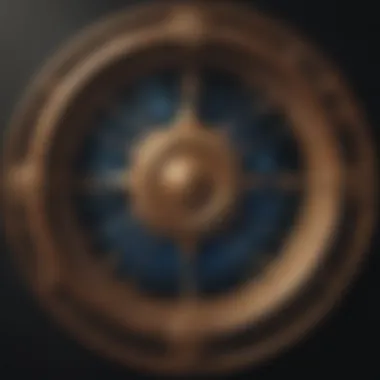Exploring Zodiac Sign Compatibility: The Love Tester


Intro
Understanding zodiac signs is more than mere observations of stars in the sky. It serves as a compass for navigating interpersonal relationships. In this exploration of zodiac sign compatibility, we will dive into the intricacies of how these celestial alignments influence romantic connections.
Zodiac signs offer a structured way to understand ourselves and those we love. The love tester concept offers a unique lens through which we can assess compatibility based on astrological principles. With this knowledge, one can foster deeper connections and cultivate personal growth.
Whether you are an astrology novice or an enthusiastic seeker of celestial wisdom, comprehending the fundamental characteristics of zodiac signs can provide remarkable insights. The following sections will unpack various dimensions of zodiac signs, including their core traits, elemental influences, and strengths and weaknesses. Together, we will dissect astrological practices that enhance one’s quality of life and relationships, eventually guiding you toward personal growth through the wisdom of astrology.
Zodiac Sign Overview
General Traits
Zodiac signs are divided into twelve distinct entities. Each sign is influenced by specific celestial bodies, which contribute to a person's unique traits and behaviors. The signs are Aries, Taurus, Gemini, Cancer, Leo, Virgo, Libra, Scorpio, Sagittarius, Capricorn, Aquarius, and Pisces. Understanding the nuances of each essence is vital in exploring compatibility.
Element and Modality
Each zodiac sign is classified under one of four elements: Fire, Earth, Air, or Water. Fire signs, such as Aries, Leo, and Sagittarius, are known for their passion and energy. Earth signs, including Taurus, Virgo, and Capricorn, show practicality and reliability. Air signs—Gemini, Libra, and Aquarius—are characterized by intellect and communication, while Water signs, such as Cancer, Scorpio, and Pisces, are deeply emotional and intuitive.
Moreover, zodiacs are also categorized into three modalities: Cardinal, Fixed, and Mutable. Understanding these classifications can help gauge compatibility. For example, Cardinal signs are initiators, Fixed signs provide stability, and Mutable signs embody adaptability.
Strengths and Weaknesses
Each zodiac sign presents its own strengths and weaknesses. Knowing these can illuminate why certain relationships thrive while others struggle. For instance, Leo’s confidence is a strength, but its pride may lead to conflicts. Similarly, Virgo’s attention to detail is admirable; however, it can also manifest as critical tendencies. Recognizing these characteristics fosters better communication and understanding in relationships.
“Compatibility is most often found when both parties acknowledge and respect each other's unique traits.”
In the upcoming sections, we will explore more profound dimensions of astrology, including detailed horoscope analysis and how these insights can engender personal growth. By the end, readers will gain a comprehensive understanding of zodiac sign compatibility and practical applications in love and life.
Understanding Zodiac Signs
Understanding zodiac signs is crucial when examining the dynamics of astrological compatibility. Each sign offers unique characteristics that shape personality and influence human interaction. By knowing these traits, one can gain insights into relationship patterns and emotional connection between partners. The zodiac serves as a symbolic representation of human behavior, connecting celestial movements with earthly experiences. Thus, understanding zodiac signs provides a framework for assessing both personal and interpersonal dynamics.
The Twelve Zodiac Signs Defined
The zodiac comprises twelve distinct signs, each associated with specific dates, elements, and qualities. These signs are:
- Aries (March 21 - April 19): Initiators; enthusiastic and assertive.
- Taurus (April 20 - May 20): Grounded; values stability and possessions.
- Gemini (May 21 - June 20): Communicative; adaptable and curious.
- Cancer (June 21 - July 22): Emotional; nurturing and sensitive.
- Leo (July 23 - August 22): Charismatic; natural leaders eager for attention.
- Virgo (August 23 - September 22): Practical; detail-oriented and analytical.
- Libra (September 23 - October 22): Diplomatic; seeks balance in relationships.
- Scorpio (October 23 - November 21): Intense; passionate and resourceful.
- Sagittarius (November 22 - December 21): Adventurous; optimistic and philosophical.
- Capricorn (December 22 - January 19): Disciplined; ambitious and responsible.
- Aquarius (January 20 - February 18): Innovative; values independence and humanitarianism.
- Pisces (February 19 - March 20): Intuitive; compassionate and artistic.
Each sign provides a lens through which to understand behaviors, motivations, and potential challenges in relationships.
Elemental Categories and Their Influence
Zodiac signs are categorized into four elemental groups: Fire, Earth, Air, and Water. Each element imbues its signs with distinctive energy and traits:
- Fire (Aries, Leo, Sagittarius): Represents passion and enthusiasm. Fire signs are often outgoing, confident, and energetic.
- Earth (Taurus, Virgo, Capricorn): Symbolizes stability and practicality. Earth signs are grounded, reliable, and appreciate the tangible.
- Air (Gemini, Libra, Aquarius): Denotes intellect and communication. Air signs are typically social, adaptable, and inquisitive.
- Water (Cancer, Scorpio, Pisces): Relates to emotions and intuition. Water signs are often empathetic, sensitive, and depth-seeking.
The elemental categories offer useful context in compatibility discussions, indicating how certain signs may interact based on shared or opposing characteristics.
Qualities of Each Zodiac Sign
Every zodiac sign is categorized into three qualities: Cardinal, Fixed, and Mutable. These qualities further influence how signs interact:
- Cardinal Signs (Aries, Cancer, Libra, Capricorn): These signs are leaders. They tend to initiate and drive action, making them decisive but sometimes impatient.
- Fixed Signs (Taurus, Leo, Scorpio, Aquarius): Fixed signs are stable and reliable, often resistant to change. While they provide consistency, they can also be stubborn.
- Mutable Signs (Gemini, Virgo, Sagittarius, Pisces): Mutable signs are adaptable and flexible. This quality allows them to adjust to various situations but may lead to indecisiveness.
Understanding these qualities permits deeper analysis of compatibility in romantic relationships, highlighting potential strengths and possible friction points. By recognizing how each sign's qualities interact, individuals can better navigate their connections.
“The more you understand zodiac signs, the better prepared you'll be to embrace the complexities of love.”
The Concept of Love Testing
Understanding the concept of love testing is crucial for anyone interested in deciphering zodiac sign compatibility. It serves as a pivotal framework, allowing individuals to explore how astrological factors can shape their romantic connections. The significance of this concept lies in its potential to demystify relationships, offering insights into compatibility that go beyond surface interactions.
What is a Love Tester?
A love tester is a tool that evaluates the compatibility of two people based on their zodiac signs. This tool often incorporates various astrological elements, including Sun signs, Moon signs, and rising signs. Users typically input their birth details, which the love tester processes using astrological algorithms to generate a compatibility score. This score offers a glimpse into how well two individuals may align in different areas of their relationship.


The primary objective of a love tester is to provide a simplified and accessible means to understand complex interpersonal dynamics. It serves as a starting point for deeper astrological exploration, where users can consider more nuanced aspects of their compatibility.
The Mechanics Behind Love Testing
The mechanics of love testing involve multiple astrological components. At its core, the love tester examines positions of celestial bodies at the time of birth. Here’s how it generally works:
- Input Data: Users enter their birth date, time, and location to generate a natal chart.
- Astrological Chart Analysis: The tool analyzes the Sun, Moon, and rising signs, alongside aspects between the two charts, to assess compatibility.
- Scoring System: The love tester usually employs a scoring system, which might range from 0 to 100 percent. This score reflects the potential harmony or conflict in various areas like communication, intimacy, and emotional connection.
Understanding the mechanics is essential because it underscores the rationale behind the compatibility scores. It means that these assessments are not arbitrary; they are grounded in astrological theory, lending them a certain legitimacy within the field.
Understanding Compatibility Scores
Compatibility scores generated by a love tester provide a numeric representation of potential relationship dynamics. These scores can vary significantly based on numerous factors, making them a focal point of interest.
It’s important to interpret these scores thoughtfully. A high score generally suggests positive interactions and shared values, while a lower score might indicate potential challenges. However, compatibility is not absolute. Personal growth and effort are crucial for any relationship. It is helpful to remember that astrology serves as a guide, not a rulebook.
In addition, users should consider the various areas the score assesses. Some love testers might include:
- Emotional Compatibility: How well partners understand each other's feelings.
- Intellectual Compatibility: Alignment in thought processes and interests.
- Physical Attraction: Chemistry on a physical level.
- Spiritual Connection: Shared beliefs and values.
Astrological Compatibility Factors
Understanding astrological compatibility factors is pivotal when discussing zodiac sign relationships. These factors bring a deeper, more nuanced perspective to how celestial influences shape interpersonal dynamics. Astrology is not merely a collection of predictions; it is a holistic examination of personalities, emotional dispositions, and relational tendencies governed by celestial bodies. Each of these elements plays a significant role in determining compatibility across various zodiac signs.
From the sun down to the moon, and even the intricate positions of Venus, every aspect contributes uniquely to the relational fabric. This knowledge assists individuals in navigating relationships with more awareness and clarity, ensuring a more fulfilling connection with their partners. Understanding astrological compatibility is not only about assessing potential matches but also about fostering personal growth through these insights.
Sun Sign Compatibility
Sun sign compatibility is perhaps the most recognized form of astrological assessment. The sun sign reflects one's core identity, ego, and will, shaping how individuals perceive themselves and interact with others. The relationships formed between sun signs can indicate the alignment or discord present in romantic engagements. For example, fire signs like Aries, Leo, and Sagittarius are generally seen as naturally compatible with each other due to their energetic and passionate natures. However, their relationship with water signs—Cancer, Scorpio, and Pisces—can be more complex, navigating the balance between emotion and enthusiasm.
Sun sign compatibility can provide a foundational understanding of attraction and affinity. While it can give clear insights into generalized traits, it's critical to consider the complete natal chart for a more complete picture.
Moon Sign Influence
The moon sign plays a crucial role in influencing emotional depth and instinctive behavior. Unlike the sun sign, which outlines one's personality, the moon sign reveals how individuals express emotions, respond to stress, and establish intimate bonds. This influence can dramatically shift compatibility assessments, leading to varying levels of connection and comfort.
For instance, a person with their moon in Taurus may seek stability and security in a relationship, while a partner with a moon in Libra may prioritize harmony and balance. Understanding these differences can help mitigate conflicts and foster a deeper emotional understanding in relationships.
Venus Position and Relationships
Venus governs love, beauty, and harmony in astrological contexts. The position of Venus in an individual's chart can reveal much about their romantic desires and partnership styles. When assessing compatibility, it's vital to analyze how each partner’s Venus interacts with the other’s planets. For example, if one partner’s Venus is in a sign that values freedom, while the other’s is in a sign that seeks commitment, this discrepancy can lead to misunderstandings.
Moreover, examining Venus can also reveal what each partner finds attractive in others. This aspect of astrology not only informs how individuals express love but also shapes expectations in relationships.
Rising Signs and First Impressions
Rising signs, or ascendants, represent how one presents themselves to the world and the initial impressions they make on others. The rising sign influences first meetings, interactions, and how others perceive an individual. Assessing rising sign compatibility can be particularly enlightening, as it can affect the chemistry between partners.
For example, a Leo rising might project confidence and warmth, which can attract attention and admiration. In contrast, a Virgo rising may reveal a more reserved and analytical approach to social situations. Such differences can influence how partners feel about each other upon their first encounters and set the tone for further interactions.
It is essential to compile the details of each sign’s influences and positions as they are interrelated and shape the relational interconnectedness profoundly.
Awareness of these astrological factors enables one to appreciate the depth inherent in zodiac connections, paving the way for richer, more informed relationships.
Practical Application of the Love Tester
The practical application of the love tester is a crucial component in understanding how zodiac signs interact in romantic relationships. This tool provides astrology enthusiasts with a tangible means to assess compatibility, based on the unique characteristics each zodiac sign embodies. The love tester goes beyond mere horoscopes by incorporating specific astrological details into its assessments.
Using a love tester can yield several benefits. First, it helps identify natural affinities and potential conflicts between different zodiac signs, offering deeper insight into relationship dynamics. Second, it promotes self-awareness by encouraging individuals to reflect on their own traits, guiding them to understand how these traits may impact their relationships. Finally, the tool serves as a fun and engaging way to explore connections with others, often sparking meaningful conversations about love and compatibility.
Considerations are also important when utilizing a love tester. It's essential to remember that while astrology can provide insight, it should not be the sole factor in determining the health of a relationship. Personal experiences, values, and communication play equally significant roles. Thus, the love tester should be seen as a complementary tool that aids in the exploration of compatibility rather than an absolute measure.
In summary, the practical application of the love tester offers a lens through which to evaluate zodiac sign compatibility. It fosters both comprehension and conversation, helping individuals navigate their romantic journeys with informed perspectives and openness.
How to Use a Love Tester
Using a love tester is straightforward. Most love testers require you to input key details about both partners, such as:


- Date of birth
- Time of birth
- Place of birth
Once you input this information, the love tester generates a compatibility score based on astrological principles. Some may also provide interpretations of the results. Take time to explore different online love testers such as Astrodienst or Cafe Astrology, which provide robust insights and detailed reports.
It’s critical to engage with the results thoughtfully. Rather than viewing them as hard facts, use them as conversation starters or tools for deeper analysis.
Analyzing Your Results
Interpreting the results from a love tester requires a nuanced approach. The compatibility score will often range from low to high, indicating varying degrees of suitability.
When examining the results, consider these points:
- Score Breakdown: Review the individual score for each zodiac sign and their interactions.
- Planetary Positions: Understand how the positions of planets like Venus and Mars may influence attraction and compatibility.
- Strengths and Weaknesses: Identify areas that may harmonize well and those that may require attention. Look for patterns within the scores.
It is essential to discuss findings openly with your partner. Doing so can lead to increased understanding and potentially helpful discussions about your relationship dynamics.
Deciding Next Steps in Relationships
The outcomes from a love tester can inform your next steps in a relationship. Based on your analysis, consider the following actions:
- Communicate: Open up a dialogue about the findings and how they resonate with your experiences.
- Experiment: Explore activities or discussions that tackle areas identified as weaknesses. This might involve improving communication or addressing specific misunderstandings.
- Reflect: Take time to reflect on your personal growth. Use the insights from the love tester as a basis for self-improvement alongside relationship enhancement.
Ultimately, the love tester serves as a tool to enrich your knowledge and exploration in relationships. By utilizing its insights effectively, you can foster stronger bonds and aim for healthier interactions.
Common Misconceptions About Astrological Compatibility
Understanding the common misconceptions about astrological compatibility is crucial for astrology enthusiasts. Many people tend to oversimplify this complex area by attributing relationship dynamics solely to zodiac signs. This approach can be misleading. Astrology does offer insights, but it should not be the only factor in evaluating compatibility.
These misconceptions can lead to significant misunderstandings among individuals assessing their relationships. It is important to recognize that compatibility is influenced by a myriad of factors, including the personal growth of individuals, life circumstances, and external influences. By debunking these myths, readers can approach astrology with a more balanced perspective and appreciate its nuances.
Debunking Myths in Zodiac Compatibility
Several myths surround zodiac compatibility that often create confusion. One common belief is that certain signs are incompatible simply by being in opposing elements or modalities. For instance, many think that earth and fire signs cannot work together. However, this perception overlooks the capabilities of individuals to grow and evolve outside their astrological classifications. The reality is much more layered.
Here are a few prevalent myths:
- Opposite Signs are Always Incompatible: This is incorrect because opposites can attract, leading to dynamic relationships.
- Sun Sign is the Only Important Factor: Focusing solely on the sun sign neglects other aspects like moon sign, Venus position, and rising sign.
- Compatibility Means a Perfect Relationship: Even highly compatible signs can face challenges; it does not guarantee a flawless union.
When approaching zodiac compatibility, remember that personal experiences shape connections much more than astrological signs alone.
The Role of Individual Growth
Individual growth plays a critical role in the dynamics of a relationship. Many people fail to consider that as individuals learn and develop, their compatibility with others can change. Personal development includes emotional maturity, awareness of one’s needs, and the ability to communicate effectively. These aspects can significantly influence how two individuals relate to one another, regardless of their zodiac signs.
Furthermore, a relationship’s success hinges on both partners' willingness to work on themselves. Compatibility can shift as individuals evolve, and recognizing this is essential in crafting healthy relationships. Understanding that zodiac signs provide a framework, rather than a definitive answer, is vital for anyone interested in astrology.
Zodiac Sign Compatibility Chart
Understanding your zodiac sign compatibility is a cornerstone of this article. A compatibility chart serves as a vital tool that outlines the interrelations between different zodiac signs. This chart can guide individuals in identifying relationships that may possess harmonious qualities or those that can present challenges. Its significance lies in its ability to summarize complex astrological relationships into an understandable format.
Creating Your Personal Compatibility Chart
To construct a personal compatibility chart, individuals must first determine their own zodiac sign along with the respective signs of their partner or those they are interested in. This requires knowledge of each sign's traits, strengths, and weaknesses. This chart may involve:
- Listing both partners' sun signs.
- Indicating the elemental category for each sign (fire, earth, air, or water).
- Factoring in additional astrological aspects such as moon and Venus signs.
- Using overlays to analyze how the characteristics interact.
By following these steps, you create a visual representation of compatibility, which can provide insights into relational dynamics.
Interpreting the Compatibility Findings
Interpreting your compatibility findings can be enlightening. Each pair of signs yields specific compatibilities, strengths, and potential challenges that may arise. This process may include examining:
- The overall compatibility score derived from the individual traits and characteristics.
- The elemental interactions; for example, water signs often align well with earth signs.
- Identifying potential areas of growth, as certain relationships can enhance self-awareness and personal development.
Compatibility scores are not definitive. They should serve as a guide, not a rule. Exploring further astrological influences will enhance your understanding.


By thoughtfully analyzing the outcomes, you gain a clearer idea of your relationship's dynamic, allowing for more informed choices moving forward.
The Impact of External Factors on Relationships
Understanding how external factors influence relationships is crucial in the realm of astrology. While zodiac signs provide insights into personality traits and compatibilities, they do not exist in a vacuum. External variables such as cultural backgrounds and life experiences play a significant role in shaping individuals and their relationships. These influences can either complement or clash with astrological compatibilities, leading to various outcomes in relationships.
Cultural Background and Beliefs
Cultural backgrounds and belief systems heavily inform how individuals approach relationships. A person's culture molds their values, behaviors, and expectations in romantic partnerships. For instance, someone from a collectivist culture may prioritize family opinions and societal norms more than someone from an individualistic background. This cultural lens can affect how compatible two individuals might be, no matter their zodiac signs.
When assessing compatibility, understanding each partner’s cultural upbringing is essential. The rituals, traditions, and family dynamics shaped by culture can lead to both synergies and conflicts. For example:
- Rituals: Engagement and wedding customs differ vastly; blending these can be challenging.
- Family Dynamics: Family involvement can vary; in some cultures, a partner's approval is crucial.
Individual beliefs, influenced by education and personal experiences within a culture, can also create differences in communication and conflict resolution styles.
Life Experiences and Their Influences
Life experiences contribute fundamentally to a person’s character and relational dynamics. These experiences, influenced by decisions, relationships, and challenges, shape emotional maturity, trust levels, and coping skills. Two individuals with similar zodiac signs but drastically different life experiences may perceive love and relationships in contrasting ways.
Consider the following points when evaluating how life experiences impact relationships:
- Past Relationships: Previous partnerships can shape one’s approach to new relationships through learned behaviors, whether positive or negative.
- Education Level: Educational backgrounds can influence communication skills, emotional intelligence, and even conflict resolution strategies.
- Personal Challenges: Overcoming adversity can lead to resilience but may also result in apprehensions about vulnerability in future relationships.
Ultimately, the interaction between astrology and these external influences creates a complex landscape in which relationships thrive or struggle. Awareness of these factors encourages more informed and empathetic approaches to nurturing relationships, leading to healthier connections for those who embrace astrological insights combined with understanding external realities.
In summary, while zodiac sign compatibility offers valuable insights, it is essential to consider cultural backgrounds and life experiences for a holistic understanding of relationship dynamics.
Navigating Relationship Challenges
Navigating the complexities of relationships can be intricate. Astrological insights offer a unique lens through which we can examine and understand potential challenges. This section highlights the significance of astrology in resolving conflicts and enhancing communication between partners. Understanding how zodiac sign differences play a role in relationships adds depth to managing these challenges. It can foster greater empathy, patience, and ultimately, growth for both individuals.
Using Astrology to Resolve Conflicts
Astrology provides a framework to understand how personal traits shaped by zodiac signs can influence interaction styles. For instance, an Aries, often characterized by assertiveness, may clash with a more reserved Cancer. Acknowledging these inherent differences is the first step in conflict resolution.
Astrological compatibility analysis helps identify points of friction. By being aware of each other's temperaments, partners can adopt strategies suited to their signs. Here are some ways astrology can facilitate conflict resolution:
- Awareness of Triggers: Understanding what emotional triggers are associated with each sign can prevent unnecessary arguments.
- Tailored Communication: Different signs respond to communication styles uniquely. Recognizing these preferences can improve discussions.
- Timing Matters: Knowing when to engage in serious conversations based on lunar phases can lead to more productive outcomes.
By utilizing astrological insights, couples can navigate their differences more effectively, leading to healthier resolutions.
Tools for Improving Communication
Effective communication is essential in all relationships. However, astrology can enhance communication strategies based on zodiac characteristics. Here are several tools that can be utilized:
- Zodiac-Based Conflict Resolution Styles: Each sign has its method of dealing with conflict. For example, Taurus may seek stability while Gemini prefers open dialogue. Knowing this allows partners to adapt.
- Astrological Journals: Keeping a journal that includes insights or observations about each partner's behaviors can shine a light on communication patterns that may require attention.
- Astrological Counseling: Professional astrologers can provide tailored advice based on both partners' birth charts, leading to understanding and harmony.
Adopting these tools aligns partners with their natural tendencies, facilitating smoother communication and reducing friction during challenging times.
The Future of Astrology and Relationship Dynamics
The influence of astrology on relationships continues to evolve, drawing interest from new generations. Understanding the future of astrology can illuminate how relationship dynamics may be shaped. As we see more individuals turning to astrology for guidance in love, its relevance in modern life grows. This section examines emerging factors that may reshape astrological practices and insights regarding compatibility in relationships.
Emerging Trends in Astrology
As interest in astrology expands, several trends are coming to light. One key aspect is the rise of personalized astrology. Leo, Virgo, or Libra are no longer broad categories but individuality specifics, tailored to one's exact birth data. Many apps and websites now offer detailed analyses based on natal charts, which provide nuanced insights. There is also a surge in community-building around astrology, where online platforms, such as Reddit, foster discussions about personal experiences with zodiac signs and compatibility.
Another trend is a move toward integrating psychological elements into astrology. This means considering mental health and emotional intelligence when analyzing compatibility. As focus shifts from mere sun signs, relationship dynamics may reflect deeper psychological insights.
Astrology is also becoming a part of wellness culture, with many practitioners advocating for self-discovery through zodiac exploration. This leads to more people using astrology for personal growth, rather than just for romantic pursuits. It is worth noting that the practice of astrology now often includes workshops and programs that teach individuals how to understand their own charts and those of their partners.
The Integration of Technology in Astrology
Technology plays a transformative role in the future of astrology. In recent years, various apps have emerged that analyze compatibility based on zodiac signs. For instance, Co-Star and The Pattern utilize artificial intelligence to provide personalized insights. These apps have made astrology accessible to a broader audience, enabling users to explore their compatibility with minimal effort.
The availability of online resources has democratized astrology. Users can easily find detailed information about their zodiac signs and compatibility factors on websites like Britannica or Wikipedia. Furthermore, social media platforms, such as Facebook, host numerous astrology groups where enthusiasts share their experiences and learn from one another.
“Astrology is not a one-size-fits-all practice. Technology allows individuals to tailor their experiences.”
The integration of virtual consultations with astrologers has also gained momentum. Many practitioners now offer services via video calls, making expert guidance easily obtainable. This convenience aligns well with busy lifestyles. However, while technology presents numerous opportunities, it is vital to remain discerning regarding the credibility of sources. Evaluating the qualifications of online astrologers ensures a more informed approach to astrology.
As astrology continues to evolve, its role in relationship dynamics remains significant. Individuals drawn to the insights from astrology often find greater clarity in their relationships. The future holds promise for more nuanced and technology-driven methods to explore love and compatibility.







